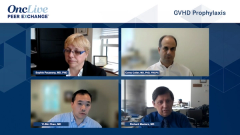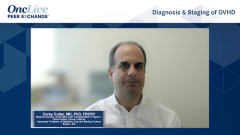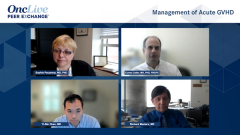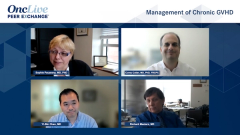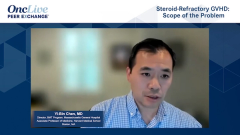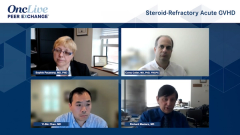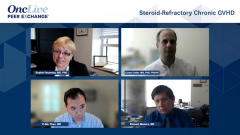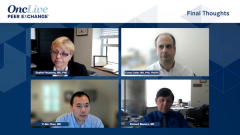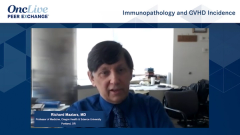
Management of Chronic GVHD
Dr Cutler leads a discussion on the approach to management of chronic GVHD and whether complete response is a realistic end point.
Episodes in this series
Yi-Bin Chen, MD: Corey, what about chronic [graft-vs-host disease] and first-line therapy?
Corey Cutler, MD, PhD, FRCPC: Again, steroids remain the frontline drug here, certainly lower doses. Alternate-day dosing may be done to avoid the toxicity of steroids because we know that in chronic GVHD [graft-vs-host disease] the time horizon is much longer than with acute [GVHD]. Therefore, the potential for steroid-related toxicity is much higher. There are a couple of groups looking at the addition of agents to the frontline therapy of chronic graft-vs-host disease. Perhaps the goal is to increase remission rates or increase the durability of remissions that we can attain in frontline therapy with chronic GVHD. Right now, there is not much in terms of looking at steroid-free approaches, although there are a number of smaller, investigator initiated-type trials that are looking at these approaches. However, there is nothing yet on the national scene here. I think as we did discuss at the NIH [National Institutes of Health] consensus conference, we are looking toward finding ways to avoid steroids in chronic GVHD. The issues are finding which patients are the ones who are most likely to respond to nonsteroid approaches, and trying to understand which biologic pathways are most relevant in individual patients to help guide those decisions in terms of which agents we should be using.
Yi-Bin Chen, MD: All the trials I have seen recently have a primary end point of overall response rate, which is appropriate for frontline and second-line therapies. There has been a lot of excitement in chronic GVHD that we will talk about in the next section. If you dig into the data, there are very few CRs [complete remissions]; CR is a mainstay for response in acute GVHD. I’ve always wondered: Is CR impossible to achieve for chronic GVHD? Is it because we don’t have the right therapy, or is it because we start treating too late? What do you all think?
Richard Maziarz, MD: I think CR is possible, however I personally do not think a cure is possible. If someone has rheumatoid arthritis, Crohn disease, multiple sclerosis, we can put them in remission with a drug, and they can have sustained remissions. But we expect at some point a flare could occur. I sort of see it the same with chronic GVHD. If cure occurs at all, it’s probably not because we’ve eradicated all alloreactive cells, it’s just that we’ve had enough epitope spreading that we now have a low affinity clone or a low active clone that’s subclinical. The biology remains; the alloreactive cells persist even in patients who appear to have no clinically active or clinically determined chronic GVHD. In the laboratory, you can show alloreactive cells. I think complete remission can be achieved, but the hard thing is sometimes separating the sequelae of the inflammatory response from the active process. As we talk about scleroderma as GVHD, someone who is left with thick fibrotic skin and hide-like texture, they don’t have active lymphocytic infiltrate, they just have the sequelae of the event.
Corey Cutler, MD, PhD, FRCPC: I agree with most of what you said. I think CR is hard to attain in some organs that are irreversibly damaged—the eyes, the lungs, and if you had enough time, the skin is the main problem with scleroderma. I think cure is a functional process as much as it is a biologic process; how much of the alloreactive T-cell process we are seeing that’s clinically relevant or clinically visible defines whether we decide someone is cured. Perhaps there is functional tolerance that develops, which is different than true autoimmune disease.
I think CR is not necessarily the goal. We’ve thought about using more functional end points like failure-free survival in chronic GVHD, where the end point is someone saying we need to do something different for this chronic GVHD. That is an action-based end point, when the physician says you need another drug, or the patient declares that they need more therapy. Those are harder because they are a little more subjective, and they’re harder from an FDA and a regulatory point of view in their use.
Yi-Bin Chen, MD: What do you think the future is for trials in the up-front space? Are we going to continue to do steroids versus steroids plus drug X and try to have an advantage in overall response for approval? Or we touched on these biomarkers, are they going to help us risk stratify, as we’ve done in acute [GVHD]? Chronic GVHD is a much more complex disease, and is biologically and clinically heterogeneous.
Corey Cutler, MD, PhD, FRCPC: As we learn how to differentiate phenotypes and biologic pathways in chronic GVHD, the field will change. We will eventually move away from steroids or use steroids only as a brief induction-type phase. The big issue here is that there are now several drugs in chronic GVHD [therapy] that are effective. We are going to have several that are going to be FDA approved by the end of this calendar year, and we are going to have to learn how to use them properly, and how to sequence them. We are also going to have to learn in which patient which drug is correct. Those are going to be very difficult trials to do because putting drugs head-to-head in chronic GVHD is not palatable to our industry colleagues. We are going to have to figure out a way of doing rational combinatorial therapy or phenotype-driven trials that are going to allow us to get these trials done without scaring off our industry partners.
Richard Maziarz, MD: We keep mentioning chronic GVHD as a single entity. Whether it’s multi-organ or single-organ; ocular GVHD requires a different management than sclerodermatous GVHD, like…is a different biologic process. I think we not only have to know how to use it, we also have to be able to find a homogeneous patient setting that will allow us to test the drug. I do think an interesting end point is, not necessarily to start with, can we replace steroids, but total steroid exposure. There was one study from Scandinavia that looks at a 1-year dose delivery of corticosteroids, partly as an end point, such as how many grams of prednisone equivalent did you have over a 1-year period? Again, as you suggested earlier, we need more quick tapers; if we were able to have a successful shorter taper and have a lot less steroid exposure, that could be a very effective end point.
Yi-Bin Chen, MD: Sophie, are we ever going to have chronic GVHD biomarkers that either help us risk stratify patients or tell us what treatment to use, or is it just not going to happen there?
Sophie Paczesny, MD, PhD: First of all, we need the samples to study this, right? For response to treatment, I have not worked with industry yet. The only ones who have response to treatment biomarkers are industry [INAUDIBLE]… there are no samples for response to treatment. Even at diagnosis, I do not have a lot of samples. We publish the full biomarker panel—ST2, CXCL9, MMP3—that seems to be confirmed in other cohorts, not OPN. As for risks, at day 100 or day 90, I got a lot of samples from the 12-02 and the cohort 0201, and so far probably CXCL9 has been discovered also by….that seems to be the best one for incidence of GVHD, predicting if they will develop GVHD. But for…marker, ST2 is one of them. I will suggest that we measure these 4 biomarkers, and if they are elevated, we should do something about these patients. They are more difficult, but I think we will need to focus on risk, and for response, we need the samples and to do some discovery about this.
Yi-Bin Chen, MD: That is a great point. It’s much easier to have samples to look for acute GVHD than chronic [GVHD]. Certainly going forward it will be interesting to see if any of these candidate biomarkers can be validated in a multicenter large analysis.
Transcript edited for clarity.


